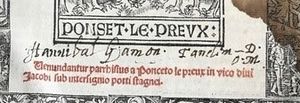Difference between revisions of "Hannibal Gamon 1582-1651"
| Line 1: | Line 1: | ||
__NOTITLE__ | __NOTITLE__ | ||
===[[name::Hannibal]] [[name::GAMON]] [[date of birth::1582]]-[[date of death::1651]]=== | ===[[name::Hannibal]] [[name::GAMON]] [[date of birth::1582]]-[[date of death::1651]]=== | ||
| − | + | [[file:GamonHannibal2.jpg|thumb|Gamon's inscription, from Dionysius Cisterciensis, ''Acutissimi et q[uam] maxime succincte'', 1511, Lanhydrock House]] | |
====Biographical Note==== | ====Biographical Note==== | ||
Born in [[place of birth::London]], the son of a [[occupation::goldsmith]]. BA [[education::Broadgates Hall, Oxford]] 1606, MA 1607; apparently based in Oxford thereafter until appointed [[occupation::rector|Rector]] of [[location::St Mawgan, Cornwall]] in 1619, where he spent the rest of his life. He was nominated as a Cornish representative to the Westminster Assembly of Divines in 1642, but never attended. | Born in [[place of birth::London]], the son of a [[occupation::goldsmith]]. BA [[education::Broadgates Hall, Oxford]] 1606, MA 1607; apparently based in Oxford thereafter until appointed [[occupation::rector|Rector]] of [[location::St Mawgan, Cornwall]] in 1619, where he spent the rest of his life. He was nominated as a Cornish representative to the Westminster Assembly of Divines in 1642, but never attended. | ||
Revision as of 05:28, 24 March 2023
Hannibal GAMON 1582-1651
Biographical Note
Born in London, the son of a goldsmith. BA Broadgates Hall, Oxford 1606, MA 1607; apparently based in Oxford thereafter until appointed Rector of St Mawgan, Cornwall in 1619, where he spent the rest of his life. He was nominated as a Cornish representative to the Westminster Assembly of Divines in 1642, but never attended.
Books
ca.350 vols identifiably owned by Gamon survive in the library of Lanhydrock House, Cornwall; this appears to be the nucleus of a collection which was originally appreciably larger. Most were acquired during his Oxford career, before moving to Cornwall, though he also absorbed the smaller collection of Thomas Peter (d.1618), his predecessor at St Mawgan. Strong in controversial theology, patristics, civil and ecclesiastical history, law and classics; the holdings, and Gamon’s annotations, suggest a theological standpoint typical of moderate Anglican Calvinism of the early 17th century. After his death, most of his books appear to have passed to Walter Snell (d.1677) and thence to the Lanhydrock library. Examples: many at Lanhydrock.
Characteristic Markings
Gamon typically inscribed titlepages with his name and the motto “Tandem D. O. M.” He regularly annotated his books, sometimes extensively.
Sources
- Duffin, Anne, 'Gamon, Hannibal (bap. 1582, d. 1650/51), Church of England clergyman'."Oxford Dictionary of National Biography".
- Purcell, M., The country house library, New Haven and London, 2017.
- Purcell, M., The library at Lanhydrock, The Book Collector 54 (2005) 195-230.
